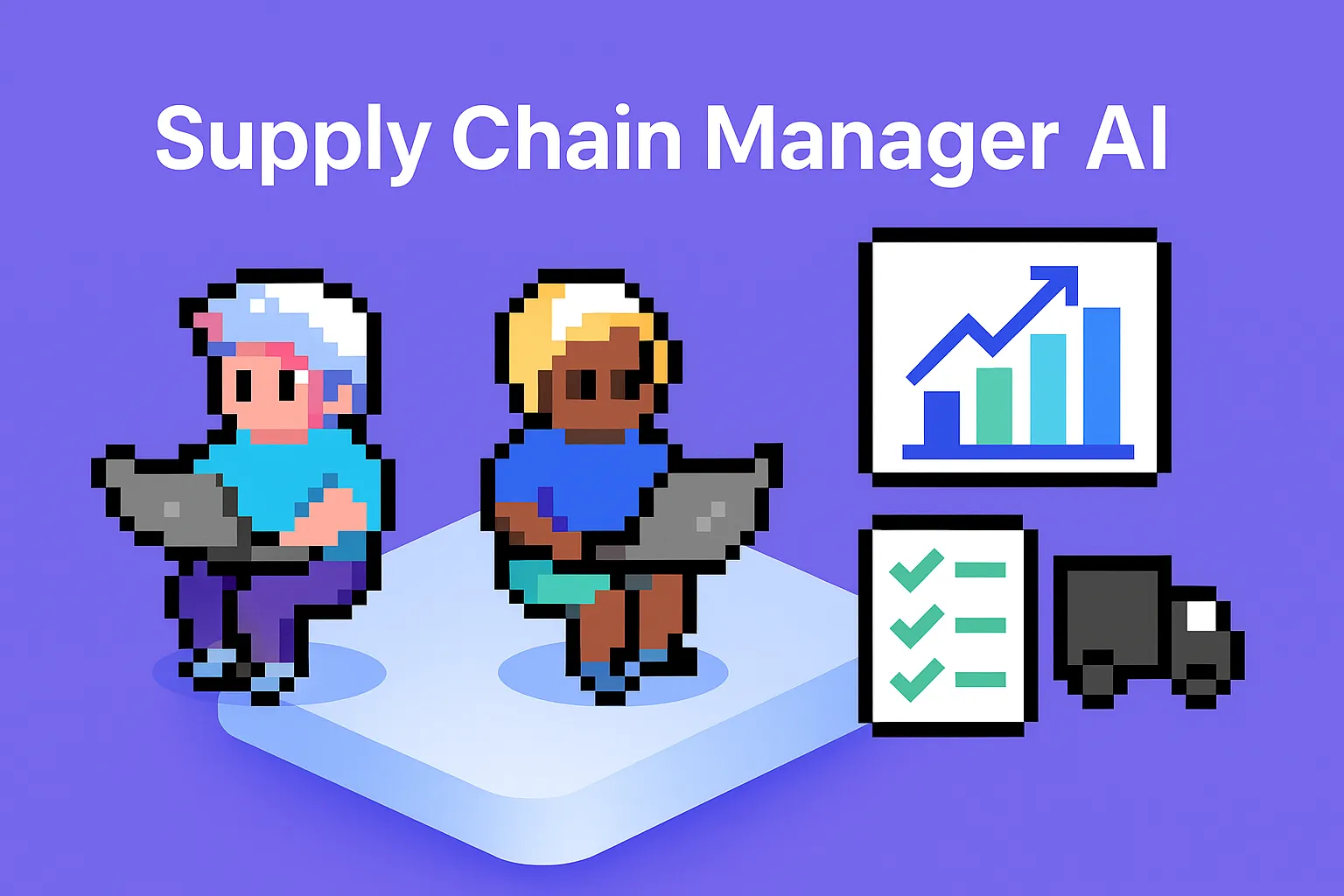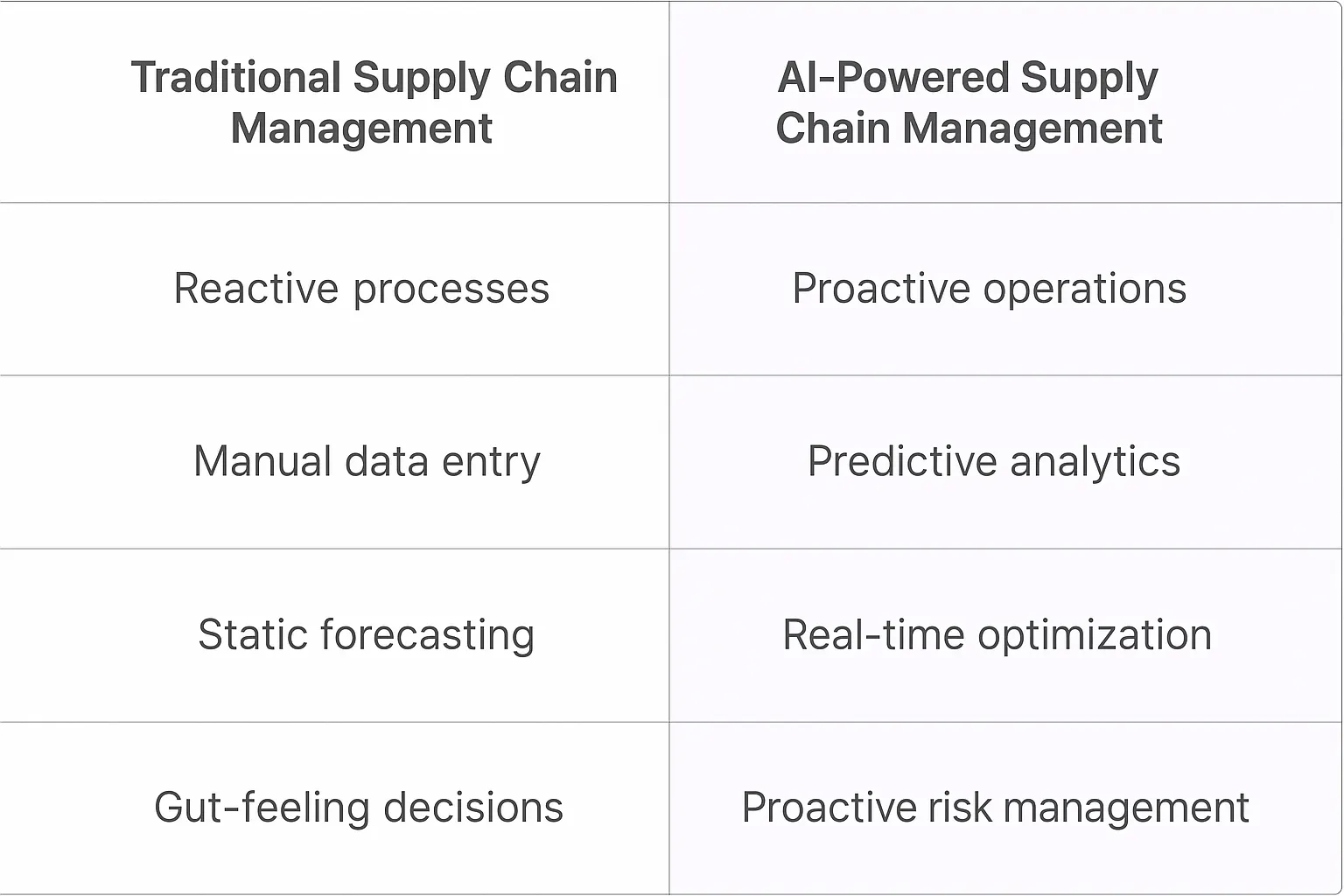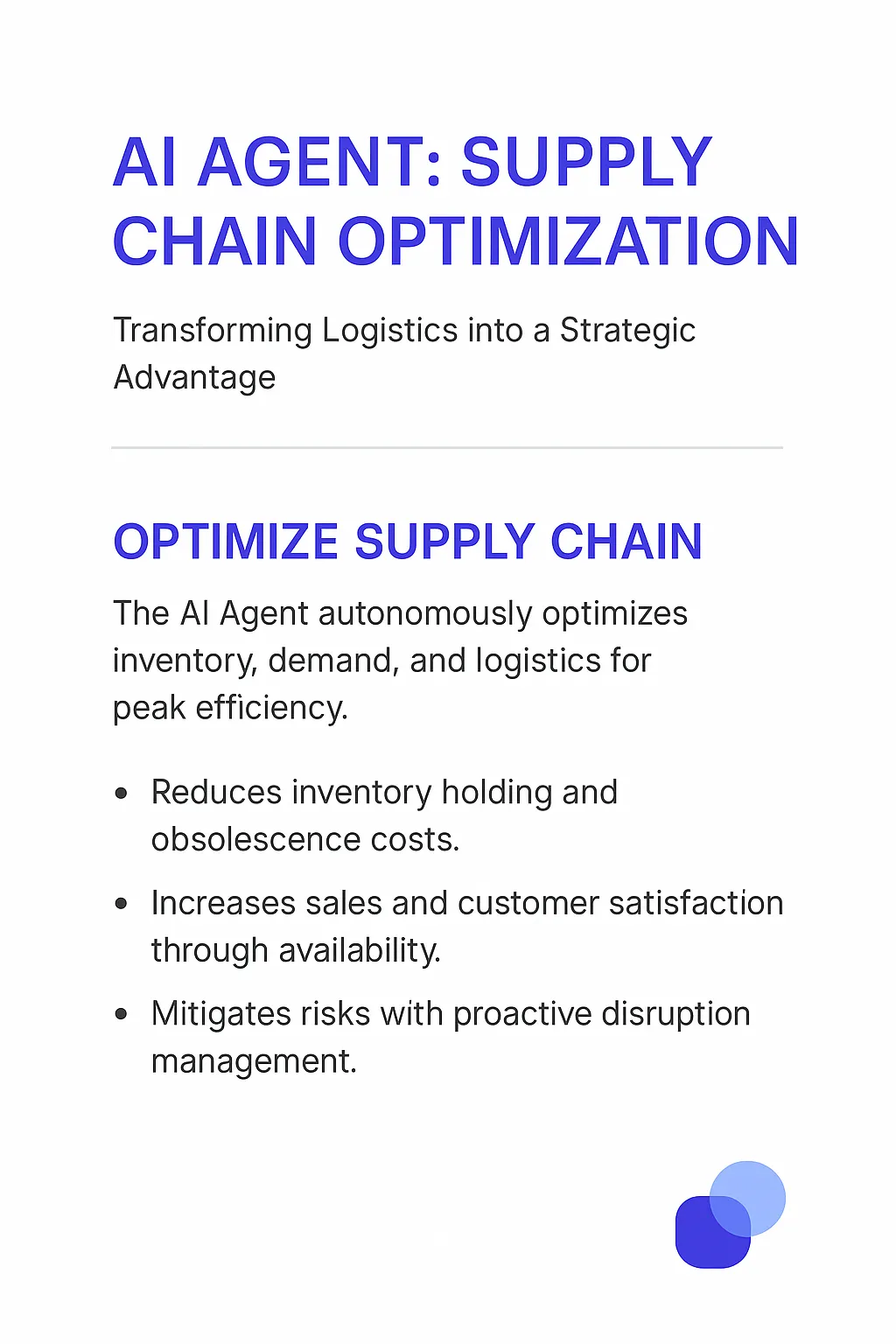Supply Chain Manager is a cutting-edge software solution that leverages AI agents to revolutionize how businesses handle their supply chain operations. It's not just another tool in the supply chain toolkit - it's more like giving your entire supply chain a brain transplant. This system integrates seamlessly with existing processes, using advanced algorithms and machine learning to analyze vast amounts of data, predict trends, and make real-time decisions that optimize every aspect of the supply chain.

Before AI agents entered the supply chain management scene, we were stuck in a world of spreadsheets, manual data entry, and gut-feeling decision making. Supply chain managers relied heavily on legacy ERP systems, static forecasting models, and endless email chains to coordinate with suppliers and logistics partners. It was like trying to navigate a complex maze blindfolded, with only occasional glimpses of the big picture.
The old way was riddled with inefficiencies. Demand forecasting was more art than science, inventory management was a constant balancing act, and responding to disruptions felt like playing whack-a-mole. Supply chain professionals spent countless hours crunching numbers and chasing updates, leaving little time for strategic thinking or innovation.
Enter AI agents for supply chain management – it's like giving your supply chain a brain transplant and a pair of superhuman eyes. These digital teammates are transforming the landscape in ways that would make even the most seasoned supply chain veterans do a double-take.
First off, AI agents are turning demand forecasting from a guessing game into a data-driven powerhouse. They're not just looking at historical sales data; they're ingesting everything from social media trends to weather patterns to economic indicators. The result? Predictions that are scary accurate, allowing businesses to optimize inventory levels and reduce waste.
But that's just the beginning. AI agents are also revolutionizing real-time decision making. Imagine having a digital teammate that can instantly analyze millions of data points to optimize routing, adjust production schedules on the fly, and even negotiate with suppliers. It's like having a supply chain war room that never sleeps.
One of the most exciting benefits is how AI agents are enhancing human capabilities rather than replacing them. They're freeing up supply chain professionals from mundane tasks, allowing them to focus on high-level strategy and relationship building. It's not about replacing humans; it's about creating supply chain cyborgs – professionals augmented by AI to make better, faster decisions.
Risk management is another area where AI agents are proving their worth. They're constantly scanning the horizon for potential disruptions – from geopolitical events to natural disasters – and running simulations to prepare contingency plans. It's like having a crystal ball that's actually reliable.
Lastly, AI agents are breaking down silos and fostering collaboration across the entire supply chain ecosystem. They're facilitating seamless communication between manufacturers, suppliers, logistics providers, and retailers, creating a level of synchronization that was previously unimaginable.
The bottom line? AI agents in supply chain management aren't just an incremental improvement – they're a quantum leap forward. They're turning a traditionally reactive function into a proactive, predictive powerhouse. For businesses looking to gain a competitive edge in today's complex global marketplace, embracing these digital teammates isn't just an option – it's a necessity.

Supply chain management is ripe for AI-driven transformation. Digital teammates can tackle complex, data-heavy processes that traditionally consume hours of human brainpower. Let's dive into some game-changing use cases:
Beyond high-level processes, AI agents can tackle granular tasks that eat up a supply chain manager's day:
The beauty of these AI-driven use cases is that they're not just about automation or efficiency. They're about augmenting human decision-making with data-driven insights, freeing up supply chain managers to focus on strategy and innovation. As these digital teammates become more sophisticated, we're looking at a future where supply chains aren't just lean and efficient – they're predictive, adaptive, and resilient in the face of global uncertainties.

The adaptability of AI agents in supply chain management is reshaping how businesses operate across sectors. These digital teammates aren't just tools; they're becoming integral parts of supply chain teams, offering capabilities that extend far beyond traditional software. Let's dive into some concrete, industry-specific scenarios where AI agents are making waves in supply chain management.
From automotive giants optimizing their global parts networks to fast-fashion retailers predicting the next hot trend, AI agents are proving their worth. They're not just crunching numbers faster; they're providing insights that humans might miss, spotting patterns in vast datasets, and even suggesting innovative solutions to complex logistical challenges.
What's particularly exciting is how these AI agents are learning and adapting to each industry's unique quirks and demands. They're not one-size-fits-all solutions, but rather specialized digital teammates that speak the language of their specific sector, whether that's pharmaceuticals, electronics, or fresh produce.
The automotive industry is ripe for a supply chain revolution, and AI agents are the perfect catalysts. Think about the complexity of car manufacturing - thousands of parts, multiple suppliers, and a global distribution network. It's a logistical nightmare that keeps supply chain managers up at night.
Enter the Supply Chain Manager AI Agent. This digital teammate doesn't just crunch numbers; it's a strategic powerhouse that can transform how automakers manage their supply chains.
Let's break it down. The AI agent continuously monitors global supply and demand patterns, using real-time data from dealerships, online configurators, and economic indicators. It's not just reacting to trends; it's anticipating them. When it detects a potential spike in demand for electric vehicles in a specific region, it doesn't just flag it - it proactively adjusts production schedules and supplier orders.
But here's where it gets really interesting. The AI agent doesn't operate in a vacuum. It integrates with the automaker's design and engineering systems. So when a new lightweight material is developed that could reduce fuel consumption, the AI agent doesn't just update the parts list. It recalculates the entire supply chain impact, from sourcing to manufacturing to distribution, and presents optimized scenarios to human decision-makers.
And let's talk about risk management. In an industry where a single missing component can halt an entire production line, the stakes are high. The Supply Chain Manager AI Agent constantly runs simulations, identifying potential bottlenecks or vulnerabilities. It might suggest diversifying suppliers in a specific region prone to natural disasters or political instability.
The result? A supply chain that's not just efficient, but resilient and adaptive. It's the difference between playing catch-up and staying ahead of the curve. For automakers, this could mean the ability to bring new models to market faster, respond more nimbly to consumer preferences, and maintain a competitive edge in a rapidly evolving industry.
This isn't just optimization - it's transformation. And in an industry where margins are tight and competition is fierce, that's the kind of edge that separates the leaders from the pack.
The fashion industry is notoriously fickle, with trends changing faster than you can say "last season's look." This volatility makes it a perfect playground for AI-powered supply chain management. Let's dive into how a Supply Chain Manager AI Agent could revolutionize the way fashion retailers operate.
Think about the challenges fashion retailers face: predicting trends, managing inventory across multiple channels, and dealing with the constant pressure of fast fashion. It's a high-stakes game where being a week late to market can mean the difference between a blockbuster season and unsold inventory.
A Supply Chain Manager AI Agent in this space isn't just tracking shipments - it's essentially a fashion fortune teller on steroids. By analyzing data from social media, fashion blogs, runway shows, and historical sales patterns, it can predict emerging trends with uncanny accuracy. But it doesn't stop there.
This AI agent is deeply integrated with the retailer's design and production processes. When it detects a rising trend in, say, neon accessories, it doesn't just alert the design team. It automatically adjusts production schedules, reallocates fabric resources, and even suggests modifications to existing designs to incorporate the trend.
But here's where it gets really interesting: the AI agent's predictive capabilities extend to individual store level. It can forecast demand for specific items in specific locations, taking into account local events, weather patterns, and even social media sentiment. This granular insight allows for hyper-localized inventory management, reducing overstock and stockouts.
And let's talk about sustainability - a growing concern in the fashion industry. The AI agent doesn't just optimize for profit; it can be programmed to balance profitability with sustainability metrics. It might suggest using excess fabric from one product line in another, or identify opportunities for circular fashion initiatives.
In the world of e-commerce and omnichannel retail, the AI agent becomes even more crucial. It can dynamically adjust inventory allocation between online and brick-and-mortar stores based on real-time sales data. If a particular item is trending on Instagram, the AI can instantly shift more stock to online channels to capitalize on the buzz.
The result? A fashion retail operation that's not just reactive, but proactive and predictive. It's the difference between chasing trends and setting them. For fashion retailers, this could mean shorter time-to-market, reduced waste, and the ability to stay relevant in an industry where consumer tastes can change overnight.
This isn't just about efficiency - it's about creating a supply chain that's as dynamic and responsive as the fashion industry itself. In a world where the next big trend is always just around the corner, that's the kind of agility that separates the fashion icons from the fashion faux pas.
Implementing a Supply Chain Manager AI Agent isn't just a plug-and-play solution. It's more like trying to teach a robot to juggle while riding a unicycle – complex and full of potential pitfalls.
First off, data integration is a beast. Your AI needs to gobble up data from multiple sources – ERPs, CRMs, IoT devices, and even external market data. It's like trying to get a picky eater to enjoy a buffet of different cuisines. Each data source speaks its own language, and your AI needs to become fluent in all of them.
Then there's the issue of data quality. Garbage in, garbage out, as they say. If your AI is fed inaccurate or outdated information, it'll spit out recommendations that are about as useful as a chocolate teapot. Ensuring data accuracy and consistency across all sources is a Herculean task that requires ongoing attention.
Let's not forget about scalability. As your supply chain grows, your AI needs to keep up. It's like expecting a small-town mayor to suddenly run a country. The computational demands can skyrocket, and your infrastructure needs to be ready for it.
On the operational side, things get even trickier. Implementing an AI Supply Chain Manager is like introducing a new player to a well-established team. There's bound to be some friction.
Change management is crucial. Your human workforce might view the AI as a threat rather than a teammate. It's like bringing a robot to a family dinner – some folks will be fascinated, others terrified. You need to clearly communicate the AI's role and how it will augment, not replace, human decision-making.
Training is another hurdle. Your team needs to learn how to work with the AI, interpret its recommendations, and understand its limitations. It's not unlike teaching your grandparents to use a smartphone – it takes time, patience, and a lot of hand-holding.
Lastly, there's the challenge of trust. Supply chain decisions can make or break a business, and handing over the reins to an AI isn't easy. It's like trusting a self-driving car for the first time – you'll be tempted to grab the wheel at every turn. Building confidence in the AI's decisions takes time and requires a careful balance of human oversight and AI autonomy.
Implementing a Supply Chain Manager AI Agent is no walk in the park. It's more like an obstacle course that tests your technical prowess, change management skills, and trust in technology. But for those who can navigate these challenges, the potential rewards are enormous. It's not about replacing humans, but about creating a symbiotic relationship where both human intuition and AI capabilities can shine.
The integration of AI agents into supply chain management isn't just an incremental improvement - it's a paradigm shift. These digital teammates are redefining what's possible in supply chain optimization, turning a traditionally reactive function into a proactive, predictive powerhouse. From demand forecasting that feels like fortune-telling to risk management that spots storms before they form, AI agents are giving businesses an edge in an increasingly complex global marketplace.
But let's be real - implementing these systems isn't a walk in the park. It's more like trying to teach an old dog new tricks while riding a unicycle. The technical and operational challenges are significant, from data integration nightmares to the delicate dance of change management. Yet, for those who can navigate these hurdles, the rewards are transformative.
As we look to the future, it's clear that AI-powered supply chain management isn't just a competitive advantage - it's becoming table stakes. The businesses that thrive will be those that embrace these digital teammates, creating a symbiosis of human intuition and AI capabilities. In this new world, supply chains won't just be lean and efficient - they'll be adaptive, resilient, and maybe even a little bit prescient. The future of supply chain management is here, and it's powered by AI. Are you ready to plug in?